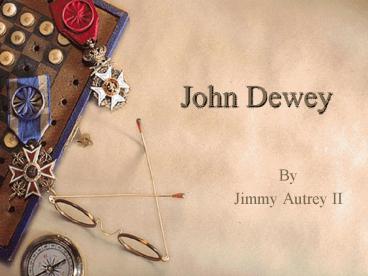John Dewey PowerPoint PPT Presentation
1 / 15
Title: John Dewey
1
John Dewey
- By
- Jimmy Autrey II
2
John Dewey (1859-1952)
- Born in Burlington, Vermont to a middle class
family - Undergrad work completed at the University of
Vermont at Burlington - Grad school at John Hopkins University
3
More biographical facts
- In college he studied political, social, and
moral philosophy - Right after his undergraduate work, he taught
high school for a while in Pennsylvania, then
returned to Vermont - After grad school he taught philosophy at the
University of Michigan - Later in his career he would teach at other
colleges, including the University of Minnesota,
the University of Chicago, and Columbia University
4
The Lab School at the University of Chicago
- From 1896-1904, Dewey directed the Lab School
(also known as the experimental school) at the
University of Chicago - This lab was intended to (a.) test
theoretically-based propositions and (b.)
increase knowledge within the education discipline
5
So how was the Lab School set up?
- The school began as an elementary school with 16
pupils, two teachers, and two assistants - It would grow to have 125 pupils (ages 4 to 15),
15 teachers, and 16 assistants by its final year
6
How did it work?
- It was considered a working experiment in
educational training/learning. Dewey called it a
microsociety. - Earliest activities were centered on occupations
like - Planting, growing, harvesting, and cooking food
- Weaving to create useful household items
- Sewing to create and repair garments
- Woodworking to create useful products
- Writing for business communication
- Drawing/painting to convey emotions
- Counting numbers to maintain business accounts
- Reading the stars to learn directions
- Resting for restoration
7
Whered they go from there?
- Students would take their occupational
knowledge and then study disciplines that related
to them. For example - Production leads to economics
- Cooperation leads to politics
- Experiments lead to science
- Community activities lead to understanding other
communities through history, social studies,
geography, and culture - Civilization-related activities lead to
understanding ethics, morals, and manners
8
- You can concentrate the history of all mankind
into the evolution of the flax, cotton, and wool
fibers into clothing. - John Dewey
9
So, what the heck were they trying to prove???
- Students dont learn logic, they live it!
- Primary skills in reading, writing, and numbers
will grow out of the needs and results of
activities - Students will seek new knowledge as it relates to
the things they are already personally interested
in.
10
Did it work?
- Dewey himself said, Like every human enterprise,
the Laboratory School came far short of achieving
its ideal and putting its controlling ideas into
successful operation. - This experiment made Dewey a major name in
educational theory. - Progressive education (well talk about this
soon) became a hot topic.
11
What went wrong?
- Many critics argue that the Lab School tried to
be too utopian with its view that students
would actively learn the essentials of education
on their own. - Critics also say that real classrooms could never
have the 41 student-teacher ratio that Deweys
Lab School enjoyed.
12
Deweys influence
King of Progressive Educational Theory
King of Pop
King of Rock
13
Progressive education
- Progressivism This perspective sees change as
the essence of reality and promotes the view that
schools should develop learners problem-solving
abilities to help them cope with it. - Progressives consider an educated person to be
someone who has the insights needed to adapt to
change. - Deweys Lab School is a good example of a
classroom working under progressive ideals.
14
Examples of progressive classroom activities
- Direct experience with the environment
- No reliance on authoritarian textbooks
- Students encouraged to ask lots of questions
- Limiting beliefs that there are large numbers of
unchanging truths that must be memorized - Solve problems and engage in experiments instead
of just memorizing others conclusions - Learners have choices about what will be studied
15
Works Cited/Additional Readings
- Fisherman, Stephen M. and Lucille McCarthy. John
Dewey and the Challenge of Classroom Practice.
New York Teachers College Press, 1998. - Tanner, Daniel. Crusade for Democracy
Progressive Education at the Crossroads. New
York New York Press, 1991. - Revisiting a Progressive Pedagogy. Ed. Nancy
Nager and Edna K. Shapiro. New York State
University of New York Press, 2000. - Boisvert, Raymond D. John Dewey Rethinking Our
Time. New York State University of New York
Press, 1998. - Campbell, James. Understanding John Dewey.
Chicago Open Court, 1995. - Smith, Philip L. Sources of Progressive Thought
in American Education. Lanham, MD University
Press of America, 1980. - Martin, Jay. The Education of John Dewey A
Biography. New York Columbia University Press,
2002.

